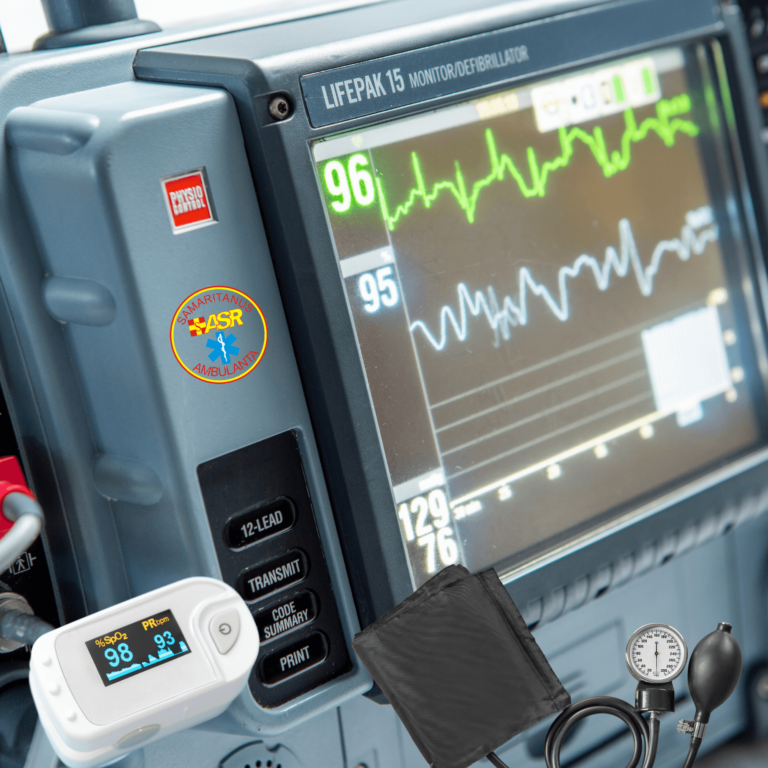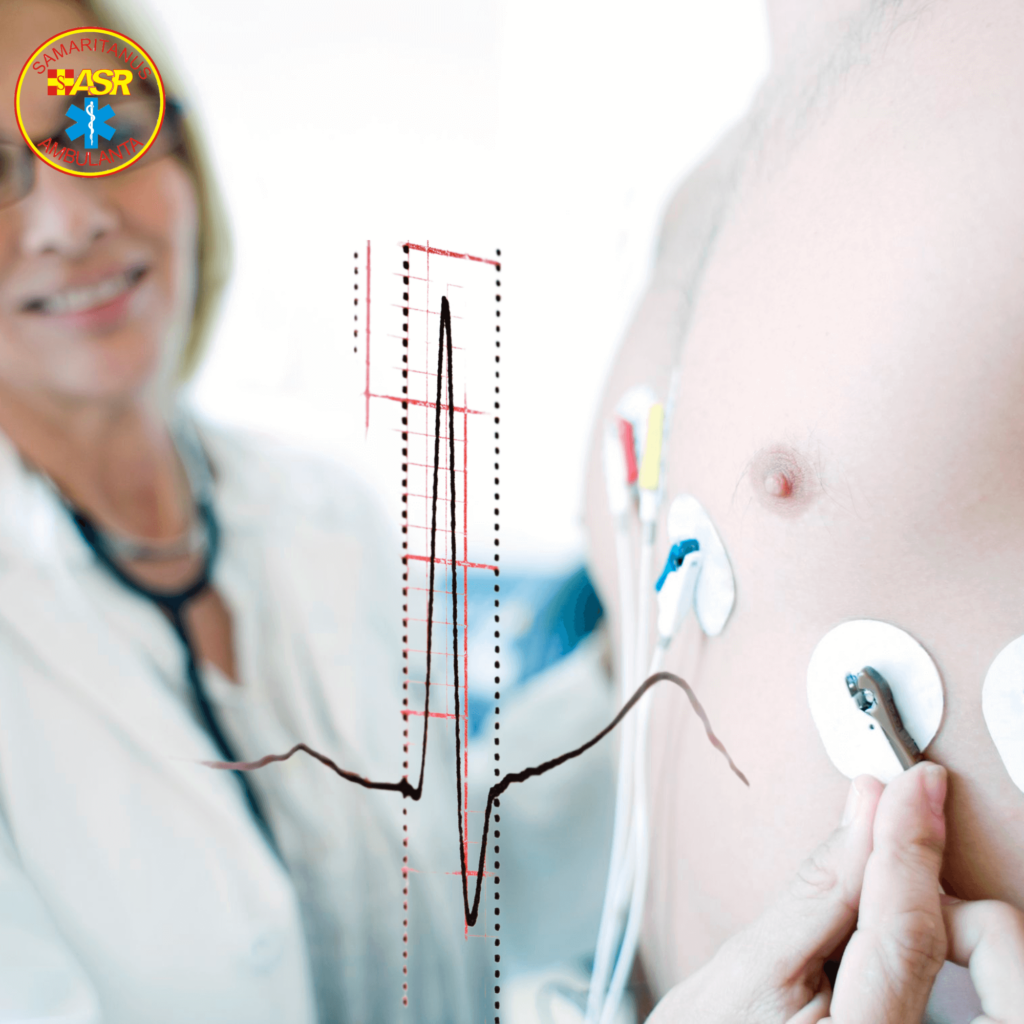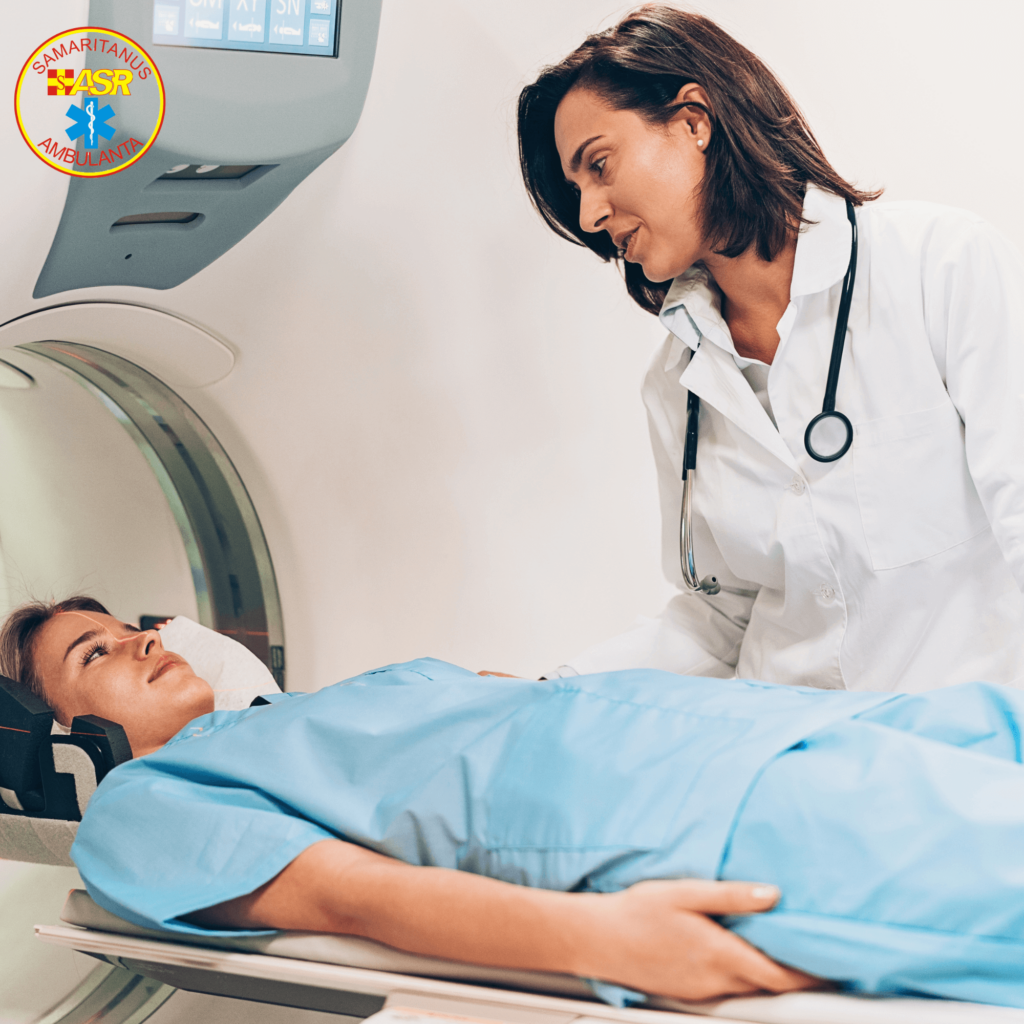Home Medical Consultations
Samaritanus Ambulance is dedicated to providing high-quality medical services directly to our patients’ homes. Our team of professionals is ready to offer a wide range of medical services, ensuring continuity of care and patient comfort.
Our services include:
Vital Function Assessment

 Blood Pressure Measurement
Blood Pressure Measurement
Monitoring blood pressure is essential for detecting hypertension or hypotension, conditions that can have serious implications on the health of the heart and other vital organs.
 Pulse Check
Pulse Check
The pulse provides important information about heart rate and the health of the cardiovascular system. A pulse that is too fast (tachycardia) or too slow (bradycardia) may indicate problems requiring immediate treatment.
 Oxygen Saturation Measurement
Oxygen Saturation Measurement
Oxygen saturation reflects the body’s ability to transport oxygen to the tissues. Low levels may signal respiratory or circulatory problems and may require prompt intervention.
 Why is this Assessment Important?
Why is this Assessment Important?
Assessing vital functions is a fundamental part of any medical consultation because:
- It provides an overview of general health status. It helps quickly identify hidden or emerging medical issues.
- It is crucial in monitoring individuals with chronic conditions, such as hypertension, lung diseases, or heart failure.
- It guides medical decisions, including treatment administration and recommendations for further investigations.
These measurements are the starting point for an accurate diagnosis and an effective treatment plan. When performed in a timely manner, they can prevent complications and save lives.
Diagnostic investigations

 Electrocardiogram (ECG)
Electrocardiogram (ECG)
The ECG is a non-invasive test essential for assessing heart health. It measures the electrical activity of the heart and can detect:
Arrhythmias (irregular heartbeats).
Signs of myocardial infarction (past or ongoing).
Problems with electrical impulse conduction in the heart, such as heart blocks.
Cardiac stress or changes associated with other conditions.
 Why is this Assessment Important?
Why is this Assessment Important?
The ECG can identify cardiovascular issues before symptoms become severe, helping to prevent major complications such as heart attacks.

 Abdominal Ultrasound
Abdominal Ultrasound
Abdominal ultrasound is a safe and effective imaging method that uses sound waves to examine internal organs, such as the liver, kidneys, gallbladder, pancreas, and spleen.
An abdominal ultrasound can detect:
-
- Gallstones or kidney stones.
-
- Inflammations or infections of abdominal organs.
-
- Tumors or other abnormal formations.
-
- Structural changes of internal organs.
![]() Why is this Assessment Important?
Why is this Assessment Important?
Abdominal ultrasound allows for the early detection of serious conditions that might go unnoticed. It is a quick, non-invasive investigation without side effects, making it ideal for diagnosing abdominal issues.
![]() These investigations, performed with state-of-the-art portable equipment, ensure a rapid and accurate diagnosis without the need to travel to a clinic or hospital.
These investigations, performed with state-of-the-art portable equipment, ensure a rapid and accurate diagnosis without the need to travel to a clinic or hospital.
Complete clinical examination

 Complete Clinical Examination
Complete Clinical Examination
The complete clinical examination consists of a detailed physical examination that covers all aspects of the patient’s health from head to toe. It includes:
-
- Assessment of general condition
-
- Observing obvious signs of illness or discomfort.
-
- Analyzing hydration status, skin color, and energy levels.
-
- Systematic examination
Head and Neck: checking the health of the eyes, ears, nose, and throat for signs of inflammation, infections, or other conditions.
Heart and Lungs: listening to heart and breath sounds to detect possible abnormalities such as heart murmurs, arrhythmias, or lung problems.
Abdomen: palpating the abdomen to check for tenderness, possible masses, or other anomalies.
Limbs: examining the joints, muscle strength, and peripheral circulation.
Additional Tests During the Consultation: If necessary, the doctor may complement the examination with investigations such as blood sugar measurement or other quick tests using portable equipment.
This type of examination is an essential step for establishing an accurate diagnosis and ensuring personalized medical care.
 Why is this Consultation Important?
Why is this Consultation Important?
-
- Allows for a thorough assessment of overall health and the identification of conditions in their early stages.
-
- Helps in understanding the patient’s medical context, including risk factors such as lifestyle or family history.
-
- Guides the decision-making process for further investigations or the initiation of prompt treatment.
This type of examination is an essential step for establishing an accurate diagnosis and ensuring personalized medical care.
Establishing the Diagnosis and Treatment Plan

After conducting the initial evaluation and necessary investigations, the doctor will:
 Analyze the collected data
Analyze the collected data
 Formulate the diagnosis
Formulate the diagnosis
 Develop a personalized treatment plan
Develop a personalized treatment plan
 Clearly communicate the next steps
Clearly communicate the next steps
-
- Integrate results from the assessment of vital functions, diagnostic investigations, and the complete clinical examination.
-
- Correlate this information with the patient’s medical history for a clear picture of their health status.
-
- Identify the underlying cause of symptoms or detected medical conditions.
-
- Diagnose acute conditions (e.g., infections, hypertensive crises) or chronic conditions (e.g., diabetes, heart failure).
-
- Recommend the optimal treatment, tailored to the specific needs of the patient.
-
- Treatment may include medication, lifestyle changes, or other necessary interventions.
-
- Explain the diagnosis and treatment in a way that is accessible to the patient.
- Provide practical advice for managing their health condition.
 Why is this Stage Important?
Why is this Stage Important?
Establishing a correct diagnosis and treatment plan is crucial for:
- Initiating a fast and effective treatment, preventing the patient’s condition from worsening.
- Providing a clear response to the patient’s questions and reducing health-related anxiety.
- Increasing the chances of complete recovery or optimal management of a chronic condition. Our doctor pays special attention to personalizing the treatment plan to ensure the best possible outcomes for each patient.
Administration of Treatment

Depending on the medical needs identified during the consultation, the doctor can administer treatments directly at the patient’s home. These may include:
 Intramuscular Administration (IM)
Intramuscular Administration (IM)
 Intravenous Administration (IV)
Intravenous Administration (IV)
 Oral Administration
Oral Administration
- Medicines in the form of pills, capsules, or syrups recommended for treating various conditions.
- Intramuscular injections used for the rapid and efficient administration of medications, such as analgesics, antibiotics, or other necessary treatments.
- Intravenous infusions or injections for treatments that require rapid and direct absorption, such as hydration, antibiotic administration, or correction of electrolyte imbalances.
 Pain Therapy
Pain Therapy
- In some cases, the doctor may administer intravenous, intramuscular, or oral treatments to reduce discomfort caused by pain. This approach, known as pain therapy, aims to:
- Alleviate painful symptoms: reduce pain and increase the patient’s level of comfort.
- Create a tolerance window: although it cannot cure the underlying disease, pain therapy offers the patient a period of relief necessary to continue the diagnostic or treatment process. After administering pain therapy, the doctor will make further recommendations, such as specialist consultations, to establish a definitive treatment plan and address the root cause of the pain.
 Why is Home Treatment Administration Important?
Why is Home Treatment Administration Important?
 Efficiency and Comfort
Efficiency and Comfort
The patient receives necessary treatment without needing to travel to a clinic or hospital, reducing stress and physical effort.
 Immediate Treatment
Immediate Treatment
Prompt intervention can alleviate symptoms and prevent a condition from worsening. Administration is performed by an experienced doctor who monitors the patient’s reactions and adjusts the treatment if necessary. The treatment is tailored to each patient’s needs, considering their medical history and existing conditions. This stage ensures not only the resolution of acute medical issues but also increased comfort for the patient, who receives necessary care in their own home.
Recommendations for specialist consultations

In certain cases, after the initial evaluation and establishment of a preliminary diagnosis, the doctor may consider it necessary for the patient to consult a specialist for a more detailed evaluation or advanced treatments.
When are referrals for specialist consultations necessary?
When are referrals for specialist consultations necessary?
 Complex Conditions
Complex Conditions
- If problems are identified that require specific expertise (e.g., cardiac, neurological, or orthopedic issues).
 Additional Evaluations
Additional Evaluations
- When more precise diagnosis is needed through additional investigations, such as advanced imaging (MRI, CT) or specialized laboratory tests.
 Specialized Treatment
Specialized Treatment
- In cases involving procedures or therapies that cannot be performed at home (e.g., surgeries, radiotherapy).
 Why Are These Referrals Important?
Why Are These Referrals Important?
- Access to Advanced Expertise
- The specialist can offer a detailed perspective and personalized solutions for the diagnosed condition.
 Ensuring a Complete Diagnosis
Ensuring a Complete Diagnosis
- Specialist consultations eliminate uncertainties and contribute to confirming or completing the initial diagnosis.
 Optimizing Treatment
Optimizing Treatment
- The specialist doctor may recommend specific treatments that improve the chances of recovery or managing the condition.
How We Support You in This Process
Our doctor will:
- Provide a written recommendation detailing the medical history and reasons for referral to a specialist.
- Suggest trusted specialists and accessible locations for consultations.
 Important: We do not handle requests for major life-threatening emergencies. In such cases, it is essential to call 112 or go immediately to an emergency room.
Important: We do not handle requests for major life-threatening emergencies. In such cases, it is essential to call 112 or go immediately to an emergency room. 
